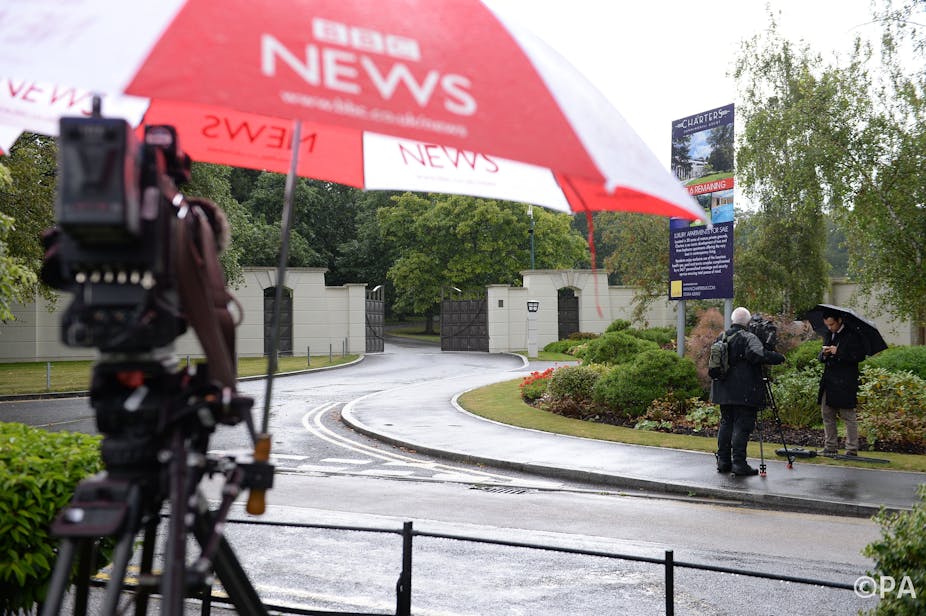When police investigating allegations of historic sex abuse searched the Berkshire home of singer Cliff Richard, it was the BBC that broke the news. Indeed, the Independent reported that when the eight officers from South Yorkshire turned up on the singer’s doorstep, the BBC had a journalist, cameraman and press helicopter already at the scene.
Richard, in Portugal at the time of the raid, proclaimed himself innocent of any allegations and complained the police “attended my apartment in Berkshire … without notice, except it would appear to the press”.
The fact that the BBC broadcast the events live from the helicopter seemed to upset some people who instinctively expect more from the corporation. The weekend papers were full of criticism, with many quoting Michael Parkinson, one of the Beeb’s most famous faces, who compared its actions to the tabloid press.
For the Mail newspapers, though, here was another opportunity to attack a reliable enemy. The Sunday Mail’s front page intoned CLIFF RAID: BBC IN CRISIS, while the editorial told us, “The enormous, unanswerable power of the BBC in modern Britain is comparable to that wielded by the trades unions 40 years ago. It is far too great and ought to be diminished.”
This rather neatly encapsulates the Mail’s historical attitude toward the corporation and we should be aware of the steady drip of anti-BBC reports which appear with startling regularity both in its newspapers and online. In the same week as the Richard raid, we heard how the licence fee is being wasted and how there was “Fury at bungling BBC” after “tributes” to Jimmy Savile – in fact an old article reporting his death that had crept back up the most-read rankings – appeared alongside website reports of Robin Williams’s.
We were also told that the Beeb has sentenced us to 100 years of boring lefty claptrap and how, according to actress June Whitfield, the BBC thinks “middle-class” has become a “dirty word”.
As a public institution, the BBC is an anathema to the Daily Mail. It stands for everything about modern society that the newspaper disapproves of. It enjoys the benefits of a fixed-tax system which allows it to fritter away public money on minority interests and inflated staff salaries. The Mail also believes, as Margaret Thatcher did, that at journalistic and management level, the corporation is inhabited by individuals dedicated to left-wing politics, multiculturalism and the dismantling of traditional values.
For its part, the corporation, or at least some on the inside, believe the relationship could be different. According to the BBC’s Middle East editor, Jeremy Bowen:
I think things are changing, but we have also been too worried about what other people think, particularly the Daily Mail. There are times we could have, instead of apologising, stood up for ourselves a bit more strongly.
We should also remember that historically, the right-wing press in the UK has consistently attempted to undermine the status of the BBC. It was Murdoch-owned publications – The Times, The Sunday Times, The Sun and the now-defunct News of the World – that allied themselves to the Thatcher government in the 1980s.
Murdoch had, and of course still has, a commercial interest in a change in the broadcasting system. Thatcher opposed the BBC ideologically, while Murdoch was interested in a solely commercially funded media. Thus, in order to attain a major footing in British broadcasting, Murdoch needed to attempt to weaken public service broadcasting. Every opportunity to criticise the BBC was seized upon, with Murdoch using his substantial media concerns to support the prime minister, while his companies received direct benefits as a consequence of policy decisions taken by her government.
The 1980s clearly saw the BBC emerge as a business rival to News International. At a time when both parties were involved in the development of satellite technology, Thatcher refused to support the BBC, while creating an environment conducive to the expansion of the Murdoch empire.
In my view the BBC was right to act upon the information it received and Dan Johnson, the journalist who received the tip off appears to have acted properly in his dealings with the police. That said, one cannot help but agree with those who argue that, with the use of the helicopter, the BBC left itself wide open to the charges of tabloidisation and sensationalism that have come its way.
But whatever our opinion on how the BBC behaved in its coverage of the raid on Cliff Richard’s home we should remember that criticism of the corporation by sections of the press is both routine and inevitable. That is not to say that the BBC is not without fault in very many cases – we can point to the Jimmy Savile/Newsnight affair as an example.
But it is a unique institution with a variety of complex constraints governing the way it is run, and criticism from the Mail in particular should be taken with a pinch of salt.

